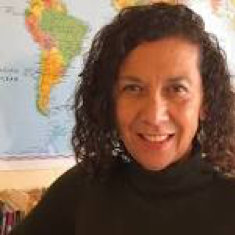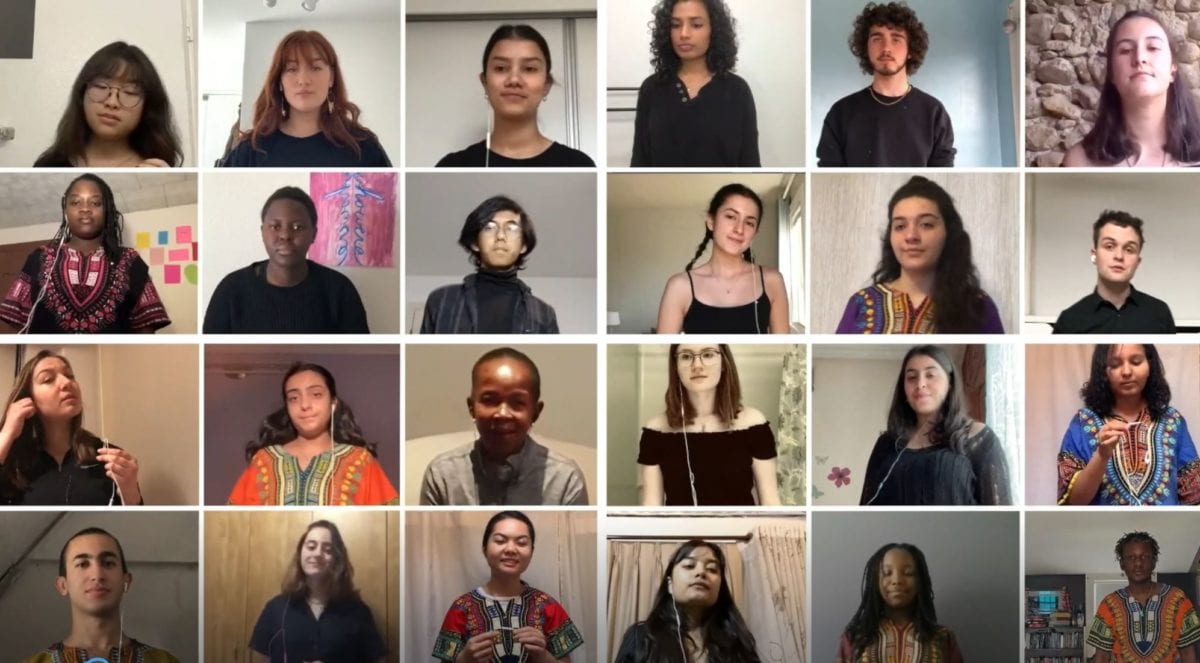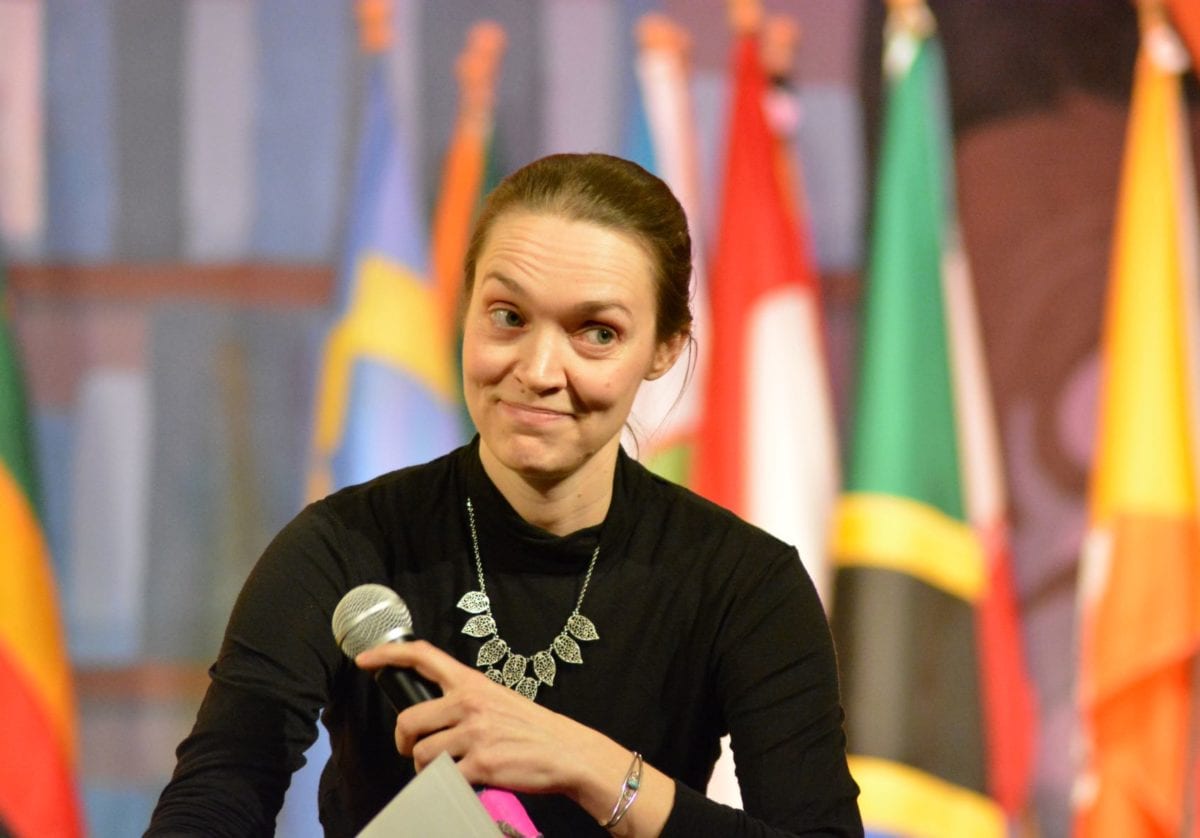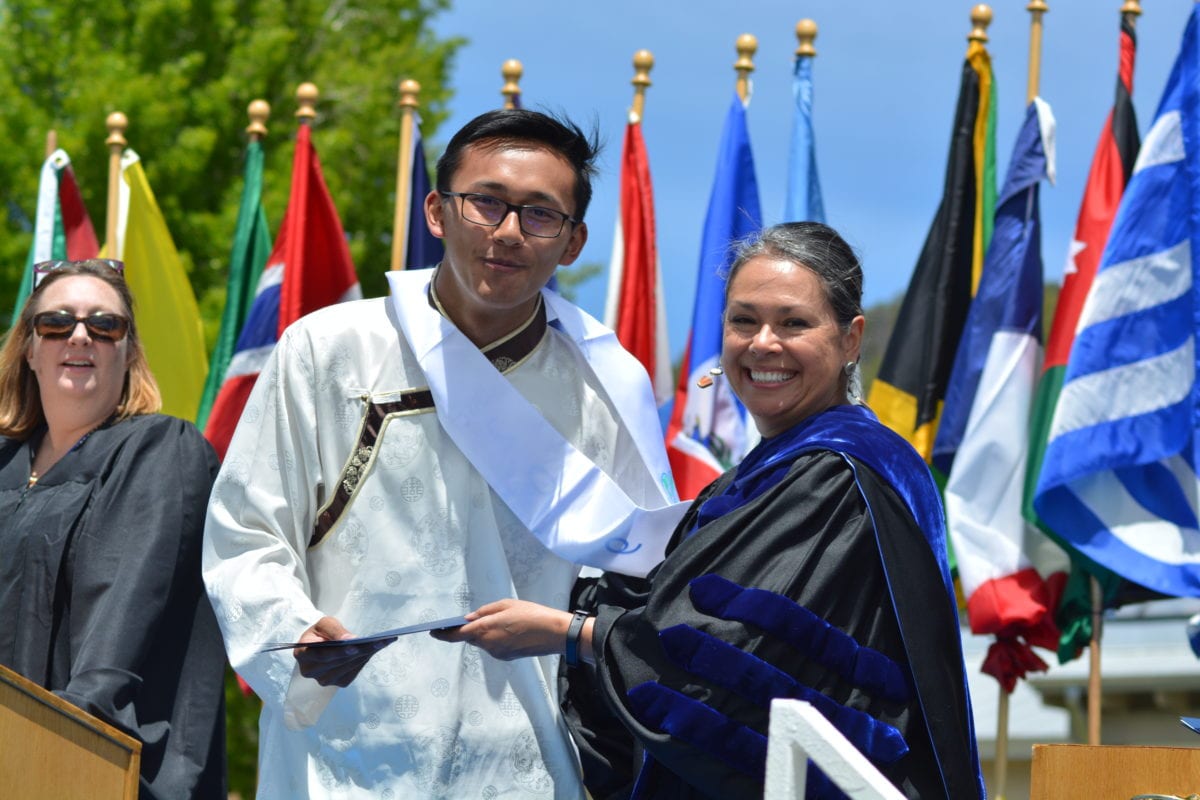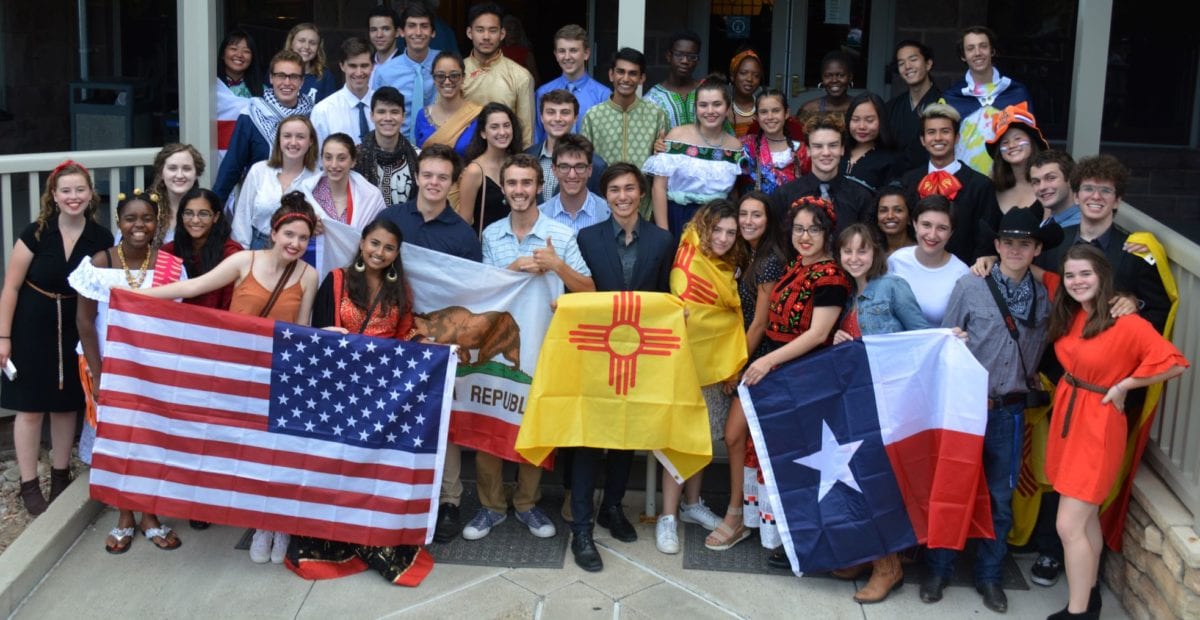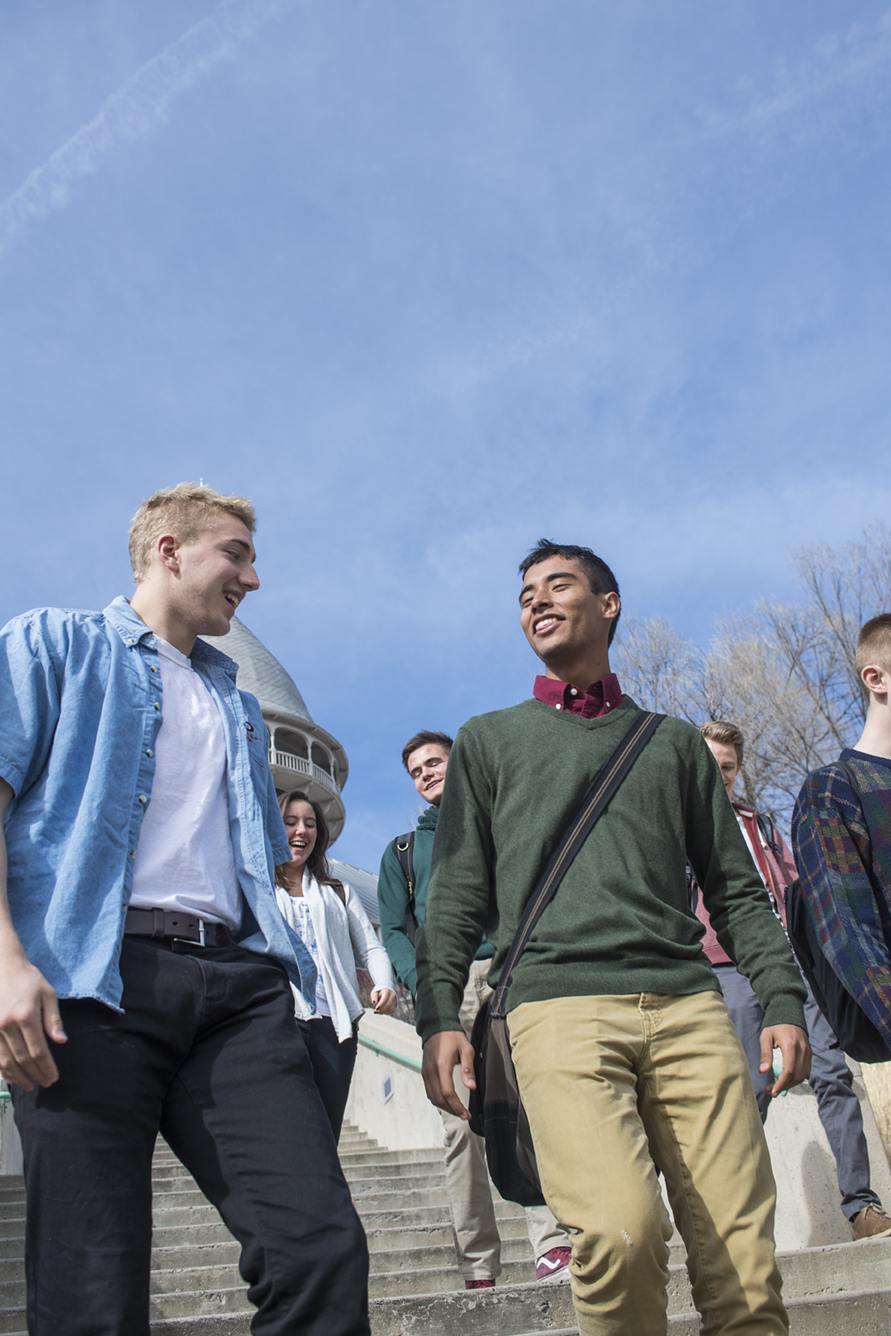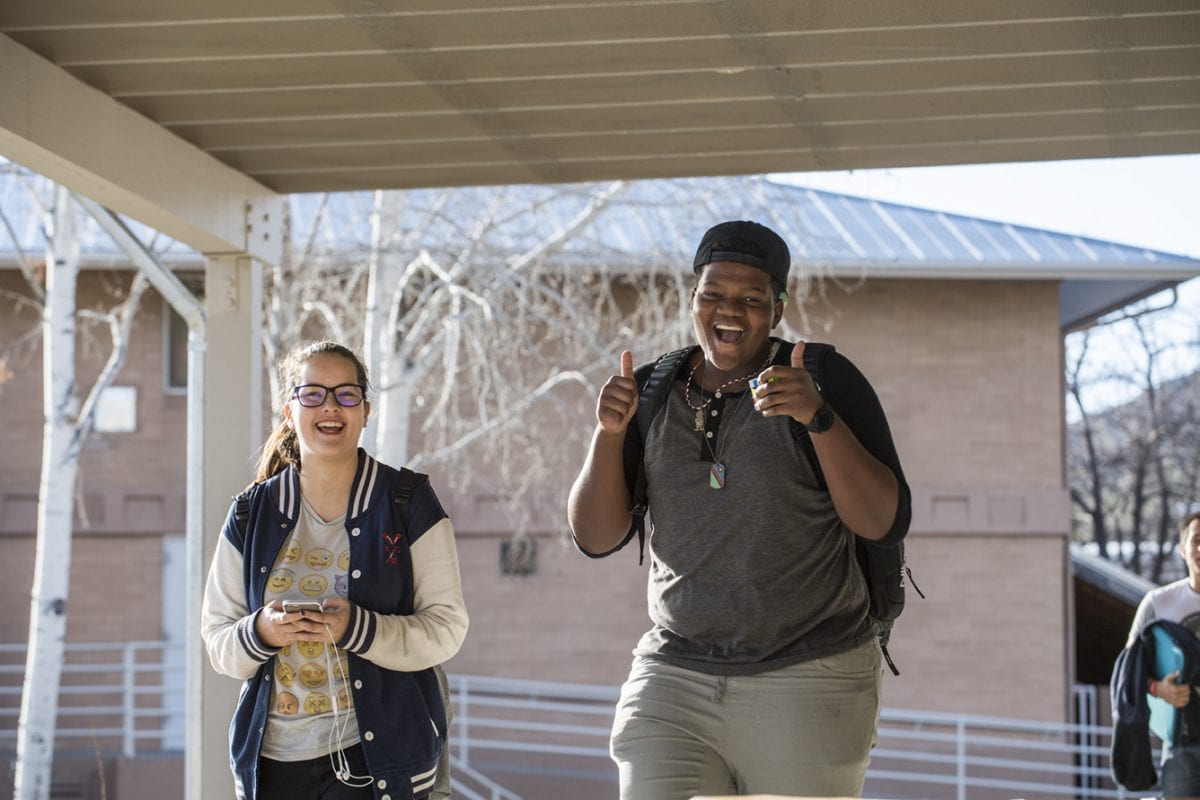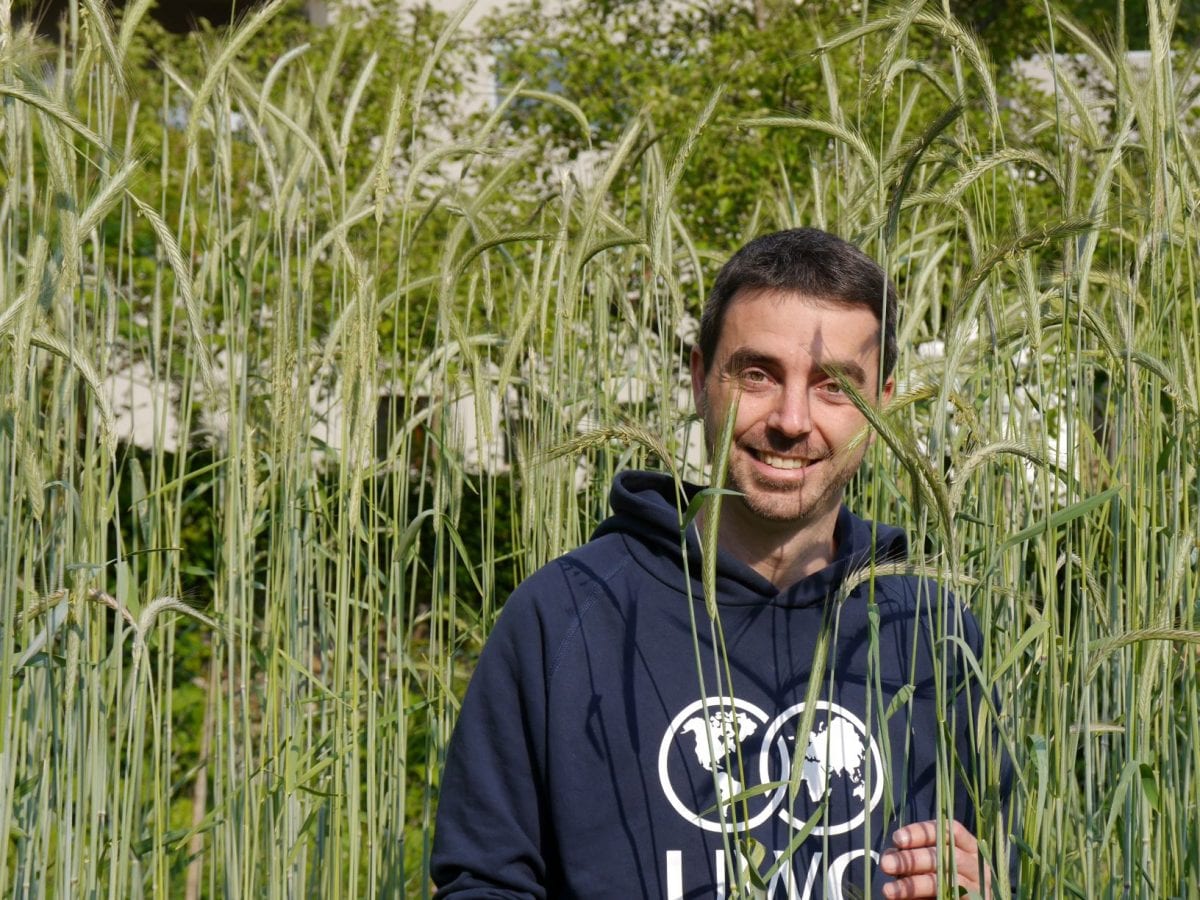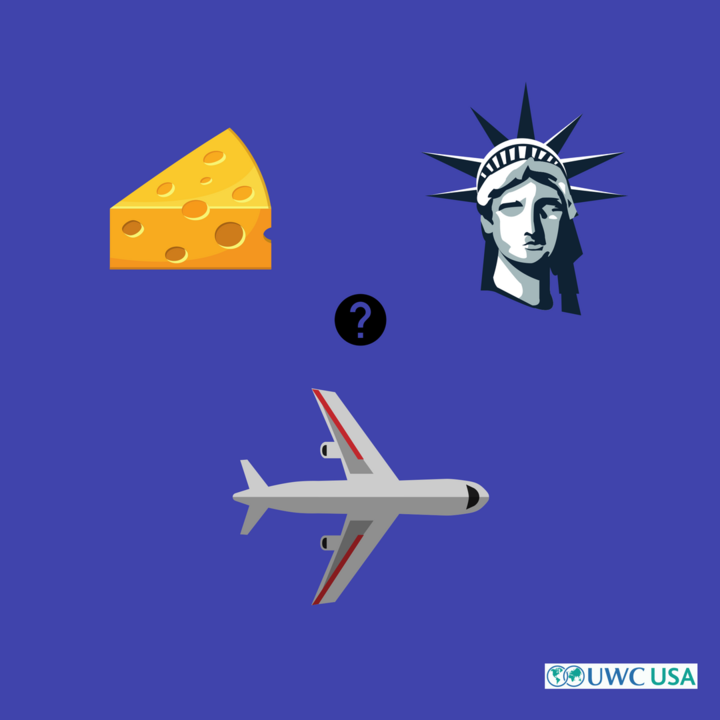Teddy Warria’s “I am from” poem lifts us to the vantage point of Sankofa, a mythical bird with her feet planted forward and her head turned backwards. The name comes from the Akan tribe in Ghana, translated from Twi as “it is not taboo to fetch what is at risk of being left behind” and implying a quest for knowledge utilizing the wisdom of the past. The UWC-USA Bartos Institute honored Teddy with a fellowship in 2018-2019, and he has honored our institution with his knowledge of history and the gifts of his friendship, writing and enduring partnership. His understanding of the importance of unity, collaboration, vision and shared opportunity has shaped our approach to working with youth at UWC-USA and beyond. Like Teddy, his poem is specific, full of gratitude, and steeped in culture. He invites us to contemplate a life lived beyond one’s own years and birthplace, giving gratitude to ancestors and transcending borders.
Some 25 years ago, UWC-USA was the recipient of a generous gift from the Bartos family, endowing an institute to equip students with the skills to transform conflicts. Over the years, students and teachers at UWC distilled a number of principles of the constructive engagement of conflict:
Strive for self-awareness
Listen humbly and deeply
Communicate courageously
Practice power of thoughtful apologies
Get curious about difference
Embrace complexity of multiple truths
Pursue solutions collaboratively
Express gratitude
In order to build self-awareness and create connections among one another, each year students are invited to write an “I am from” — or “Yo soy de” poem. This exercise yields personal insight and creates a medium for sharing our stories with one another. Teddy took the assignment to heart.
In schools around the world, students and educators are working to understand one another’s histories, unpack meaning, and listen well. Poetry is a powerful tool for truth telling, and for repair. For many, education has been — and continues to be — a colonizing endeavor, not a liberating one. UWC asks how education can be a force for peace and sustainability. It is urgent that we answer creatively. Teddy’s poem is an example of how understanding our individual and collective past can ground us in our aspirations for the future.
Schools can advance intergenerational understanding, and help communities reckon with economic and racial segregation. Poetry is a start, and we can also model the work of truth and reconciliation. In communities fraught by civil conflict, Truth and Reconciliation Commissions have operated as community schools and shown us the path toward liberation from past injustices. Study the past to understand the present; identify and investigate patterns of events; engage directly impacted people, and honor and learn from their experiences; create shared recommendations and propose agreements to repair relations; present to authentic audiences, and hold decision makers accountable, asking for public commitments and acknowledging the power of the community to transform the future together. The “I am from” poem is a personal beginning, an exercise in freeing ourselves on the page so that we can work with others toward the self-expression that gives greater understanding and freedom. Write yours and share it with us and let us know how your poem serves as a beginning for healing in your community.
“I am From”
PART I: NYITHIND LUO – IN PRAISE OF THE CHILDREN OF LUO[1]
I am from fishermen, bone-fixers, tailors, and craftsmen.
I am water. I am sun. I am wind. I am an African.
From omena[2], tilapia, sweet potatoes, and ondelo[3].
I am Kamnua[4] Village in Kisumu, the home of fireflies and K’Warria[5], and BuruBuru[6] I Estate House No. 150 in Nairobi – the place of cool waters in Maasai[7].
Unassuming, vibrant, vibrant and lovers of life are the Warrias.
I am from smooth Aloe vera[8]
Full of cacti and plenty of natural healing properties;
I am from snake plants[9] that gives plenty of oxgen in a room at night; and from the legendary snake Omieri[10] in Nyakach.
I am from mango and tamarind juice;
I am from Joka’Warria[11] and sunny sunflowers –
Bold, bright, and resolute.
From Wilfridah Atieno “Minai” Ombodo and George Edward “Eddy” Lovell Aoko Warria — simply Mama and Baba, to whom we ran to as we welcomed them in the evenings with the simple words, “Baba Ichololo[12], Mama Ichololo.
I am a child of my mother, and a son of my father.
Also, I am from: Leonidah Ombodo from Asembo Bay[13] and Seme K’Obita[14] and Rosalina Ajwang’ Warria of Nyakach K’Oguta[15] and Nyakach K’Adiang’a[16], Bedina from K’Atito[17] in Nyakach[18], Sophia “NyaSukuma”[19] from Mwanza, Tanzania, and “Nyakonguru”[20] – all my grandmothers.
They taught me the ancient ways of the Luo[21] through our oral tradition of story telling around a smoke-filled traditional Luo kitchen with a three-stone firewood cooking stove as water boiled on earthen pots.
I am from Migosi[22] Francis Okomo-Okello[23] Owagi[24] William “Baba” Odhiambo Okello[25] of Nyangera Village who gave me “A History of the Luo-Speaking People of Eastern Africa” that gave me knowledge and insights of the Luo of old and who finds home at Got Ramogi – Chuny Piny!
I am from Migosi Francis Okomo-Okello Owagi William “Baba” Odhiambo Okello of Nyangera Village[26] who gave me “A History of the Luo-Speaking People of Eastern Africa”[27] – it gave me knowledge and insights of the Luo of old and he finds home at Got Ramogi – Chuny Piny![28]
I am a latter-day son of Maria Soccoro Nunez[29], Karen “Mrs. De” DeBartolo[30], Elizabeth Mary “Namangale” Awori Okelo[31], Nardos Bekele-Thomas[32], Prof. Paul Chabeda[33],
and Prof. Adebisi Babatunde Thomas[34] – a 21st Century Pan-Africanist from the Yoruba[35] people in Nigeria[36] resting in the fields at the Holy Trinity Church[37] in Addis Ababa, Ethiopia.*
I am from intellectuals, farmers, and business people;
From TedWach – literally meaning cook words or say something in Luo.
Genius, Magic, and intuition define me.
I am from the Luo-Speaking People of Eastern Africa, and a latter-day Christian and Global Citizen.
I am a dedicated member of the United World College[38] Movement as a Bartos Fellow[39] at the United World College-USA, and through it I have become an accidental Native American – the true Guardians of Mother Earth in New Mexico true!*
I am an African who speaks Sheng, the urban patois, originally a mélange of English and Swahili. In recent times it has metarmophised to a combination of English, Kiswahili and the native languages – popularly spoken in the streets and slums of Nairobi.*
I am from Kisumu, the home of the Equator, and from the mighty Nile River – all the way from ancient Egypt through Khartoum, Bahr-el-Ghazal[40] and into the banks of Lake Victoria in Western Kenya, via Uganda.*
I am Wuod Luo[41] from Kisumu[42] who responds willingly to the beats of Kisumu Ber[43], Wamiel[44], Lo[45] by Suzanna Owiyo[46], and Benga[47] songs from Daniel Owino “D.O” Misiani, a Kiseru man from Shirati inTanzania.
I am a JaK’adian’ga[48] who enjoys listening to Geoffrey Oriema’s – The River;
And Ayub Ogada’s[49] – Kothbiro[50], En Mana Kuoyo[51], and Wa WINJIGO Ero[52].
I am Nyatiti[53]. I am Orutu[54]. I am Bul[55]. I am a drumbeat.
I am a Luo, from the Luo Nation, who followed the mighty River Nile, where we derive the name of our Tribe, into the present-day Kenya as the Joka-Jok[56] cluster. We are a supremely self-confident people, who gave the United States of America its 44th President, Barack Obama.*
Rech, apoth, mito, boo, atipa, osuga, kuon bel and dek are indigenous foods that have built my cells and DNA for centuries and make my bones strong, my mind alert, and on the path of being diabetes-free!
I am Tedros[57] as affectionately called by my Habesha Mother who is Oromo;
I am Almaz – The Black Diamond, as lovingly called by a Habesha Queen.
I am Ethiopian®[58] – The Newest Spirit of Africa!
I have the Star of David as whispered to me by a Nilotic Tugen[59] Girl from Mogotio in Baringo, The Great Rift Valley.
I am the one who spoke to the soul of Caity Mpishi, who sang to me Amazing Grace like
God’s own aeolian harp. She taught me the we are all cast from the same clay, and that I too belong to the American mainstream at a time I thought I was not. Her Faith guided her to the principle of Umoja[60].*
She was open to the world, and was able to bridge the greatest distance between her heart and mind. I am the autodidact she introduced to Achille Mbembe’s “On the Postcolony”, Khalil Gibran’s “The Prophet” and Wangari Maathai’s “Unbowed”.
I am the African she introduced to Lady Blacksmith Mambazo in a Live concert in Boston and over 600 songs and Sufi poetry. I am because she was.*
From the patriarch Warria Aoko JaNyakach of Sawo Clan in Nyabondo Got Mesa[61] in Nyanza, where I find my roots.
The Clinical Pyschologist, Dr. R. Ajwang’ Warria of University of Witswatersrand “Wits” in South Africa, the immaculate and willing dancer, Gordon Aoko Warria, our last born the novelist, Elizabeth. I am grateful to my Caregiver from the time I was a toddler, Caroline Akinyi, who twice with her tremendous care and love has brought me from the brink of death.
I am the ever-present uncle to Mathematician and Artist, Alexandra Lydia Khamoji,
Bryden Adhiambo Owuor, Leah Awuor Owuor, Tracy Atiang’ Marita “Little Mermaid” “Cookies” Birigi Warria, Joel Odhiambo Warria, Malcolm Ochieng’, Nina Amani Odhiambo, Kevin George Warria, Ryan Francis Warria, Ahero, Kwe, and Hawi, among others.
I am the grandfather of Maria.*
We are the Warrias all over the world:
Switzerland, USA, South Africa, Austria, Germany, UAE, and Kenya.
They all form my inner core and I live with them and for them, always.
I am the 10th of 17 children from a polygamous East African Family.
I am a Connector, A Weaver of humankind,
a Child of Nyasaye Nyakalaga[62],
a Lamb with the heart of an indomitable Lion.
I am the pupil who Mrs. Katua taught to sing Shosholoza
in 3rd grade at BuruBuru I Primary School at the height of apartheid
in South Africa,
and in solidarity with our suffering South African brothers and sisters.*
I am the young student who the late (Rtd.) Major General James Ombaki of the Kenya Army entrusted to lead a pack of 2,000 select kids from all over Kenya to write with their bodies, 10 Years of Nyayo Era, at Nyayo Stadium to mark a decade of the rule of President
Daniel Arap Moi.
I am the student at Lenana School who Mrs. Fridah Caroline Wamanga introduced to environmental justice, cultural exchange programmes and maps.
I am the meek student who Bi. Salome Kuvuna Maneno taught “Mashetani”[63]
and Lahaja Ya Mvita[64] under a tamarind tree at Lenana School by choice.
I am the student Mrs. Sarah Juma mentored and passed her nuggets of wisdom and reason to.
I am the English language student who Ms. Dorah Kitala taught to speak the King’s English to the Queen’s taste.
Eloquence, Excellence, and Nobility she imparted on her curious and alert students.*
I am a keen student of Dr. Laura L. Graves of South Plains College[65] who taught me the history of the contiguous United States of America and mentored me in understanding the “The Power of Servant Leadership: A Journey into the Nature of Legitimate Power & Greatness” by Robert K. Greenleaf and Journey to the East / “Die Morgenlandfahrt” by Herman Hesse as she likened me to Leo – the unassuming and quientessential servant leader in the novel, without whom the Journey to the East was not going to be possible.
I am a latter-day student of Prof. Larry Diamond and Prof. Francis Fukuyama of Stanford[66].
They taught me and shared their books: “The Spirit of Democracy: The Struggle To Build Free Societies Throughout The World” and “Identity: Contemporary Identity Politics and the Struggle for Recognition”.*
I am the son of the soil, who speaks with the melodic voice of the Hopi[67] Indians.
We are the Africans. We are the Africans we have been waiting for!*
I am one of NYITHIND LUO[68] who slept at Gwinnett House[69], and in Button Gwinnett’s[70] bedroom in Georgia.
I am the son of the soil who saw his first image of a white woman carrying a heavy load on her head.
I am the first Wuod Luo to be in the land of The Guale Indians[71].
I am a beneficiary of Fredrick Douglas[72] – Prophet of Freedom.
The visit and time for reflections was made possible by the bonds of friendship to a namesake, DSS, and most importantly because Naomi got to know me on board a flight to Aspen.
I am the global citizen who was reading 491 Days: Prisoner Number 1323 / 69 – the story of our heroine, uMama Winnie Madikizela-Mandela.
Much later Naomi Swinton[73] gifted me 1491: New Revelations of the Americas before Columbus, whose knowledge and insights will help me to create a bridge to heal an act of history.*
Responding to Earth’s Call;
I am growing a forest – Mottainai[74] Amani[75] Park in honor of environmentalist, Wangari Muta Maathai, at Palos Nature Conservancy[76] in Kibos, Kisumu, and supporting causes that ban single-use plastic and restoring Lake Victoria, the third largest fresh water lake in the world teeming with Tilapia and Nile Perch.*
Responding to Africa’s Call;
I started Africa Cancer Foundation together with Prof. Peter Anyang’ Nyong’o, now Governor of Kisumu, and Dorothy Nyong’o – both of Kisumu Ber. Parents of Lupita Amondi Nyong’o of Seme – land of all NyaSemes, my mother’s home!
Responding to Mandela’s Call;
I am growing leaders by building #100Mandelas – A Flagship Project of Africa Rising, an organization that uses education, technology, film and media to empower voices and inspire a new state of mind in young people in Africa and all over the world!*
Responding to Humanity’s Call;
I am supporting Dr. Richard Leakey to build NGAREN[77]: The Museum of Humankind in Turkana – The Cradle of Humankind.*
Responding to Creativity’s Call;
I am raising young entrepreneurs through A Prosperous Africa – A Platform for equipping African entrepreneurs with inspiration, resources, know-how, and opportunities that they need to set up succeed in their startups.*
I am the Japuonj[78] with his own Siwindhe[79]
who mentored and coached Eston Kimani to get into MIT and stay in MIT and to found Africa’s Talking in the dorm room,
I am the Japuonj who mentored and coached
Gerald Pambo-Awich to join Bard College, Goldman Sachs, and Harvard Business School,
I am the Japuong who mentored and coached Dr. Kemunto Mokaya of Ms. Jacinta Akatsa’s Precious Blood Secondary School Riruta to join Yale University and Yale School of Medicine, among many other mentees.
I am the one who cracked the Code of MIT, without a bribe, and opened the doors of Wall Street wide open for Kenyans.*
I am the one who mentored Marlon Ingaywa Kidiiga and Graham Ingokho Muhanga to greatness.
I am the one who believes in the grassroots mentoring efforts of Rev. Dr. Julius Weche of AKAD.*
I am the younger brother of Joseph William Okelo and together we make the Sons of Nyakach – JoLuo thiring’inyi[80], mor Nyakach pacho[81].
I am the youngest brother of Simon Njoe of Geneva.
I am owagi Rosemary Okello who champions data-driven Africa and the preservation of grandmother stories as the seat of wisdom in Africa.
I am the spiritual son of Arlano Funderburk of Levelland, Texas, who is an Imitator of Christ.
I am the friend of Dr. Sherman Hope of Brownfield, Texas, who not only healed with his hands, but from his soul.
I am the big brother of Joshua William Nunez who properly introduced me to these United States of America together with Brett Zook.
I am the one Rose and Dorothy Muya of Timeless Tours and Travel took in at an hour of need, and together we changed the world.
I am a collaborator of Martin Mbaya and together we are bridging West and East Africa through ABTEI.*
I am a pan-Africanist because Eunice Ajambo introduced me to Africa 2.0.
Together with Mamadou Kwidjin Toure, Founder of Africa 2.0[82], we gathered Africa’s Tribe One and authored the Africa 2.0 Manifesto.
President Uhuru Kenyatta of Kenya and Jeff Koinange respectfully call me 2.0.*
I am a child of Ali A. Mufuruki of Africa Leadership Initiative (ALI) East Africa. Through Ali, I became a kid brother to Rehema Kasule who is my Lever for Change!*
I am a pan-Africanist because Fred Swaniker invited me to co-author the unique African Leadership Academy’s (ALA)[83] curriculum: Leadership, Entrepreneurship, and African Studies (LEA).*
As the ancestors increase in number,
I remember an intrepid ancestor, Binyavanga Wainaina[84] of Lenana School[85], who confidently called me Teddy is a warrior, and a good one.
His Pilgrimages project[86] to authentic African stories and voices, we must continue and complete in this life as Sojourners.
As a good ancestor he left us with Yvonne Adhiambo Owuor[87] and Chimamanda Adichie to guide us.*
I am Teddy Warria, the African Warrior, as first called by Rt. Hon. Raila Amolo Odinga, author of “The Quest For Nationhood: Roadmap To Our Future – How Kenya Can Recover Lost Ground And Achieve Prosperity For All”[88].
He called me so during the 50th anniversary celebrations of the African Union (AU) in Addis Ababa, Ethiopia.
I am the African Warrior who is championing the African Continental Free Trade Agreement (AfCFTA), Agenda 2063, and the integration of Africa.*
Nkosi sikelel’ iAfrika[89].
The Chinese call me BoLe[90], and Japanese Sensei[91].
The Indians at PayTM[92] call me Baisap[93].
Jack Ma[94] calls me The Artist, and Dr. Mukhisa Kituyi[95] Jathurwa![96]
Ndaba Mandela[97] calls me my brother as he plays for me Sizzla’s – Solid as a Rock!
Music and dancing make me at peace with myself and my ancestors, the rhythm connects me to them in an infinite continuum.
I am beauty, love, and justice.
At this moment, I am blessed by the ancestors to lead the dance between the lions and the dragons in the African Savannah, and to bridge the gap between African Americans, Africans, and Americas from the land of the Zia and Ute[98] – New Mexico and Colorado – The Mountain States.*
I am Umoja,
meaning oneness or unity in Swahili.
I was born to bring people together and to bring balance to the world.
Rit Nying’a Nyathina[99].*
Copyright © 2019 Teddy Warria, Kharis Weller, Carlos Rayos at Silverton Public Schools, Siverton, USA.
UWC-USA Project Week – A Project of the Bartos Institute, UWC-USA
www.uwc-usa.org
Notes:
[1] Nyithin Luo means the children of Luo.
[2] A fish type called Sardines
[3] Luo popcon roasted over jiko – traditional stove
[4] Name of Teddy Warria’s Village in Kisumu, Western Kenya
[5] The home of Warria
[6] Premier housing estate developed by the Commonwealth Development Agency. The word Buru Buru is derived from the bird “Bul Bul”
[7] The indigenous owners of Nairobi
[8] A naturally occurring medicinal plant full of cacti and naturally occurring products
[9] Sansevieria trifasciata
[10] A mythological name for a mighty python snake
[11] The people of Warria
[12] A welcoming sound when one is coming; both parties run to each other in welcome
[13] A bay in Lake Victoria, in East Africa
[14] Location in Kisumu County, Western Kenya
[15] This is in upper Nyakach, part of a constituency in Kisumu, Western Kenya
[16] This is in lower Nyakach, part of a constitutency in Kisumu, Western Kenya
[17] This is in lower Nyakach, part of a constitutency in Kisumu, Western Kenya
[18] This is part of a constituency in Kisumu
[19] She is from the Sukuma tribe of Tanzania, East Africa.
[20] The sweet lady
[21] A river lake Nilotic tribe found in Eastern Africa
[22] This means “mister”
[23] Chairman of TPS Eastern Africa and ABSA Bank, formerly Barclays Bank
[24] Luo word meaning, “the brother of”
[25] Founded the student airlifts to Russia, USSR and the former Eastern Bloc countries
[26] A village in Got Ramogi, Siaya County, Western Kenya.
[27] Copyright 2009 by Bethwell A. Ogot. Published in Kenya by Anyange Press Ltd., Kisumu
[28] Means the epicenter of the earth
[29] She is from Levelland, Texas and Chihuahua, Mexico, USA
[30] From Middleburg Village, Schorie County, New York, USA.
[31] From Samia, Busia County, Western Kenya. Founder of Makini Schools and Kenya Women Finance Trusts, Kenya
[32] From Oromia, Ethiopia; currently serving as the UN Resident Coordinator, South Africa.
[33] Former UNEP Biodiversity Chief and Tom Mboya Airlifts student beneficiary
[34] Founder of ABTEI; Adebesi Babatunde Thomas Entrepreneurship Institute, Strathmore Business School, Nairobi, Kenya
[35] A tribe in Nigeria, Western Africa.
[36] The largest economy in Africa, and the most populous nation in Africa
[37] Ethiopian Orhodox church in Addis Ababa, Ethiopia
[38] A network of 18 high schools spanning the globe whose mission is to use education as a force to unite people, nations and cultures.
[39] A fellow of the Bartos Institute, United World Colleges, USA.
[40] Confluence of the Blue and White Nile rivers in Sudan, Africa
[41] Meaning the son of Luo
[42]City whose name means, “a place for barter trade”
[43] Meaning “Kisumu is nice or good”
[44] Meaning we are dancing, or Let’s dance
[45] Meaning, Soil
[46] A talented Luo traditional singer of Nyatiti (harp and guitar)
[47] A genre of songs created by the luo with percussion…….. …..
[48] Meaning I am a man from Kadianga
[49] He was a gifted instrumentalist who played with musicians Peter Gabriel and Paul Simon
[50] Meaning “The rain is coming”
[51] Meaning “it is just sand”
[52] Meaning, “We are listening to you”
[53] An 8 stringed harp, musical instument
[54] A one stringed instrument, similar to a violin
[55] Drum
[56] The last cluster of Luos to arrive in Kenya during the migration
[57] An Amharic name, meaning “Divine Gift”
[58] The Ethiopian national airline carrier, also a metaphor for the New African.
[59] Highland Nilotic people from the Rift Valley area of Kenya.
[60] Meaning “oneness or unity” in the Kiswahili language
[61] Plateau in Nyakach, Western Kenya
[62] God Almighty in Luo language
[63] Ibrahim Hussein’s “Mashetani” book. A Kiswahili set book for high school
[64] Dialect of the Mvita people of the Kenyan Coastal region
[65] Junior College in Levelland College, West Texas, USA
[66] Stanford Univesity in California, USA
[67] A native Indian tribe in the United States of America
[68] The children of Luo
[69] A private home in St. Catherine’s Island in Georgia, USA
[70] One of the signatories of the US declaration of independence, “The US constitution and other writings”, copyright 2017 Cantebury Classics, p49
[71] Native Indians of St. Catherine’s Island, Georgia, USA
[72] A friend of Abraham Lincoln who helped abolish slavery in the United States of America
[73] Director of the Bartos Institute at UWC-USA, Montezuma, New Mexico, USA
[74] Japanese for reuse, reduce, recycle, meaning “no waste”
[75] Meaning Peace in Kiswahili language
[76] Private nature conservancy in Kibos, Kisumu, Western Kenya
[77] The place of beginnings in the Turkana language, Northern Kenya.
[78] Luo word for “Teacher”
[79] A classroom, not necessarily of brick and mortar
[80] Meaning the authentic Luo
[81] The joy of the people of Nyakach, the home.
[82] Africa 2.0 international, available online at www.africa2point0.org
[83] Premier school in Africa developing young leaders for Africa
[84] Author of “How not to be an African” and a human rights activist
[85] Leading national school in Kenya, founded in 1949 with the motto, “Nothing but the best”
[86] TBA
[87] The author of the book, “Dust, Dragon Sea Fly” and Cain Prize winner
[88] Copyright Raila Odinga 2017, published by Mountain Top Publishers Ltd.
[89] Meaning, “God bless Africa”
[90] Meaning one who discovers people of great talent
[91] Meaning “master”
[92] Pay Through Mobile, a digital money transfer company in India
[93] Meaning “Friend”
[94] The co-founder and Executive Chairman of the Ali Baba Group
[95] Secretary General of UNCTAD; United Nations Conference on Trade and Development
[96]Meaning “our countryman”
[97] The author of “Going to the Mountain: lessons from my grandfather Nelson Mandela” and co-founder of Africa Rising
[98] Native Indians in the mountain states of the United States of America
[99] Meaning, “Please protect my name and legacy, my son”

